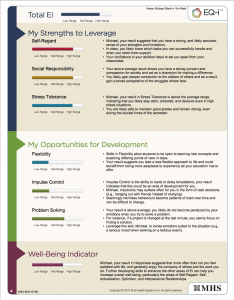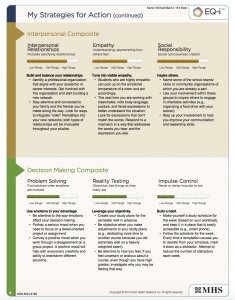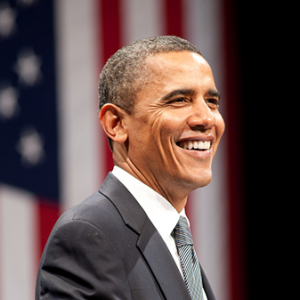After taking the EQ-i assessment, I am now aware of my strengths and weaknesses. I have included them below.
I found the EQ-i to be among the most fascinating things that I have done in flourishing and in college overall. After taking the EQ-i, I have learned about several of my strengths and weaknesses. Although I expected this to be in my strengths, I learned that my self-regard is exceedingly high. I have found this to be true throughout my life, as I have always been very confident and occasionally overconfident in what I can do. With this in mind, it is important for me to ask trusted friends and peers for feedback on what they see my strengths and limitations to be, whether they are in my academic or personal life.
Additionally, after taking the EQ-i I have learned that I have a strong sense of social responsibility. I was also not surprised by this result as I have always had a concern and passion for making a difference in society. Also my empathy has driven me to act occasionally outside of my personal best interest in order to better others. This may make me occasionally follow through with decisions that leave me worse off.
The EQ-i that I took also said that I have an exceedingly high stress tolerance. This surprised me somewhat, as I do often get very stressed. This result does make sense, however, because I have always been able to withstand a large amount of stress and succeed in multiple areas regardless. This aspect of my EQ-i can be disadvantageous if my high stress tolerance ultimately encourages me to take on more tasks than I can handle. This is because even though I may be able to withstand the stress, these added activities may take away from my other desired activities.
Meanwhile, the EQ-i did teach me about how I need to become more flexible. Prior to taking the EQ-i, I never truly considered my lack of flexibility as a weakness. Now after taking it, I have been made aware of my inflexible nature, as I have often struggled to change my point of view and my opinions in class and in debates overall. In the future, I will try to adjust it my flexibility by making an effort to be more adaptable to other people’s views.
The EQ-i has also taught me about others. From the EQ-i, I have learned that IQ is not a sufficient measure of whether a person will succeed, as emotional intelligence is also an important factor in a person’s success. The EQ-i has also taught me that everyone can improve their emotional intelligence in many facets. In this regard, even strengths can be issues and can be improved upon. For example, my confidence may be a strength in that it allows me to speak to people without fear and be happy with who I am, but my high confidence can also create fixable problems. My high confidence can lead to overconfidence, as it can cloud my vision of potential errors in my judgement. In this way, a person’s strengths can also be weaknesses, so everything can be worked on to improve one’s emotional intelligence.





































